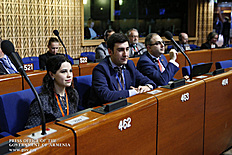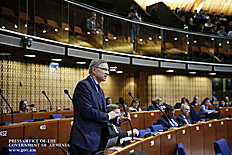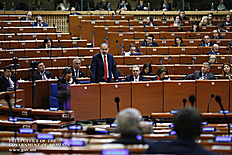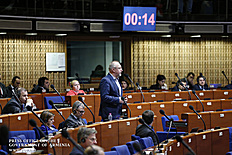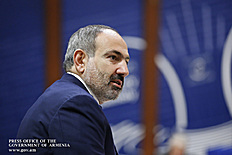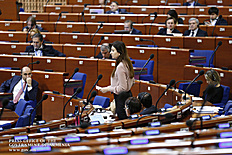Statements and messages of the Prime Minister of RA
Nikol Pashinyan Answers Parliamentary Assembly Delegates’ Questions at PACE Plenary Session
more 3 photos
Question - Mr. Prime Minister, you touched upon Armenia-Azerbaijan relations in a few sentences. Azerbaijan is not the only country in the region; there are other countries, and I think you have some problems in your relations with those neighbors as well. Are you satisfied with the current level of relations with them, and if not, what are you going to undertake in this direction?
Prime Minister Nikol Pashinyan – Of course, not only do we have neighbors with which our relations are not that good, but there are also neighbors with which we have good and even very good relations. I mean, in particular, Georgia and Iran, with which we entertain high-level relations, and we are engaged in a high-level dialogue with these countries.
We are trying to develop our bilateral relations. You may know indeed that we have no interstate relations with Azerbaijan and Turkey. In fact, we do not have diplomatic relations, and that says it all. Everything is clear about Azerbaijan, while the situation with Turkey is somewhat different, because Turkey ties its relations with Armenia to our relationship with Azerbaijan. Armenia, in turn, has not changed its position. We have repeatedly declared that we are prepared to establish relations with Turkey without any preconditions.
As regards our relations with Azerbaijan, I have already outlined our vision, and I wish to emphasize that we see our relations with Azerbaijan and other neighbors on the peace agenda. I am glad that in the course of its activities, our government has actually been able to put the peaceful agenda at the heart of our international relations. Thank you.
Question - Thank you, Mr. Prime Minister, for presenting the path you have covered and your country’s achievements. My congratulations! I would like to ask you about the ongoing legal proceedings against some former political figures, and also, how guaranteed is the judiciary’s independence in those cases?
Prime Minister Nikol Pashinyan - Thank you for the question, the problem with the judicial system is the most pressing for us, for the country, for our government, because there was a revolution in the political system of Armenia, but no revolution has occurred in the judicial system.
I can assure you that having a 100% independent judicial system, the rulings of which could be trusted not only by the Armenian society, but also by the international community is a key issue for us.
Recently, when an EU delegation arrived in Armenia, they took note of our position regarding the judicial system’s independence and asked me a direct question how far we were going to push with the establishment of an independent judiciary. And I answered them in a straightforward manner that we are ready to go all the way since we understand that we cannot guarantee the final and irreversible institutional and permanent strengthening of our democracy without a truly independent judicial system.
Do we have such a judicial system today? Unfortunately, I cannot give you a 100% guarantee. What I can state confidently is that our government has eliminated the presumably existing practice when the judicial system used to be directed by the government. We have completely abandoned that practice. It may sound a little strange, but I am not 100% sure that the other tools of influence on the judicial system have not been preserved. And I am not sure that there is no corruption in our judicial system, because for example, just 10 days ago, a judge in Armenia was arrested upon receipt of a bribe. However, please do not doubt that we are fully committed to the agenda of building an independent judiciary. Thank you.
Question - Mr. Prime Minister, I want to ask you a question about the relations with Iran. Iran has checkered relationships with Europe. How do you imagine the development of relations between Armenia and Iran, especially in the context of cooperation with the European Union?
Prime Minister Nikol Pashinyan - I can say that in all my contacts with high-ranking European officials I saw that our European partners understand the importance of Armenian-Iranian relations and agree with our desire to maintain normal relations with Iran and develop them.
As for the international situation around Iran, you know, we feel highly embarrassed in such a difficult situation as we see our friends on opposite sides of political contradictions. I mean that our friends are on both sides.
And of course, we hope, we urge and wish that political contradictions could be solved in the logic of dialogue, because dialogue is the only way to handle problems in the 21st century.
And frankly speaking, I saw the same perception and understanding during my contacts with all our European partners. Of course, I was not able to communicate with everyone in person, but our views were tied in over the same understanding with our EU partners. Thank you.
Question - In April 2018, this Assembly approved my report on the set of measures aimed facilitating the fight against organized crime and the process of confiscating legal assets. I know that fighting crime is one of your government’s priorities. Can you tell us which way you see your cooperation with international partners in this area in terms of applying the internationally recognized best practices?
Prime Minister Nikol Pashinyan - Thank you for the good question, because it was very important that such a question be voiced in the Parliamentary Assembly of the Council of Europe.
We are now discussing whether the introduction of the institution of confiscation of assets without a bill of indictment could be acceptable for our country. And in this regard, there are quite serious concerns in Armenia, including among the former government’s representatives.
I consider it important to emphasize that this is not only an internationally recognized practice, but, in fact, since 2015 it has been included in the framework of international commitments made by Armenia, including to the Council of Europe.
I would like to mention that this mechanism is stipulated in the Council of Europe Convention on Laundering, Search, Seizure and Confiscation of the Proceeds from Crime and the Financing of Terrorism, the UN Convention against Corruption. Armenia assumed specific commitments in connection with this mechanism in 2015 in the framework of the MONEYVAL monitoring group of the Council of Europe.
To be honest, from my point of view, this is a mechanism that can and should be implemented in Armenia, but, as I said, Armenia is a democratic country, and decisions are not made solely, and we should have broad discussions about this institution. We have to make a decision following discussions, and of course, our cooperation with the Council of Europe will be very useful in this regard so that no one may try to interpret or use this as a tool of persecution, because this page in our country is closed forever. Thank you.
- Question on external interference in the political processes underway in Armenia
Prime Minister Nikol Pashinyan - Thank you. If you noticed, in my speech I specifically stressed that there was no interference of any foreign power in Armenia’s revolution, but sometimes the public at large can witness rather a strange debate on the matter at hand. When, for example, during my visits or press conferences, people try to tell me that a color revolution has taken place in Armenia, each time I emphasize that we have not carried out a color revolution, but a revolution of love and solidarity. And by these words, naturally, should be understood in their political implication. The point is that no external political force was involved in our revolution. I rule out that anyone could indicate the involvement of any external force whatsoever in our internal processes.
I have always said that for us it is a matter of national dignity; for me personally it is a matter of personal dignity, and it is important to stress that democracy really stems from our people’s mindset. I think that it is for this reason that today we have the situation you are talking about. There are still publications in international media outlets stating that there was some kind of geopolitical or foreign policy context, but everyone should be convinced that everything happened exactly the way I said, and this is very important.
The Armenian revolution is not directed against any country, it is not against any organization. The Armenian people made a revolution for the sake of their free and happy future, and we intend to develop our relations with all our international partners.
Armenia is a member of the Eurasian Economic Union, we are now chairing this organization and will do our best to make it even more effective.
Our relations with Russia are of strategic nature, and we will do our utmost to develop these relations. In terms of security, we are a member of the Collective Security Treaty Organization, and we will do our utmost to make this organization more effective.
We have excellent relations with the European Union, which is due to a very specific reason. The fact is that the Comprehensive and Enhanced Partnership Agreement with the European Union, its content thoroughly ties in with our government’s agenda, with the agenda that we initially planned to implement, with the reform agenda that we are gong to implement in our country. Thank you.
Question - How well do you think the Council of Europe promotes the development of democratic institutions, human rights and freedom of speech in Armenia?
Prime Minister Nikol Pashinyan - I have always considered it necessary to underscore in answering a similar question that when it comes to democracy, human rights and freedom of speech, they are often deemed to be purely European values. I agree with this of course, but let me say that they are also Armenian values. I mean that we do not perceive democracy as something imported from outside or something exported to other countries.
This is a system of values that stems from our people’s mentality and aspirations. If we state this fact, then we can say that we share absolutely the same ideas with the Council of Europe about what democracy is and in what logic democracy should develop.
I said in my speech that while there were no foreign forces involved in our revolution, and this is true, but Armenia’s 18-year-old membership in the Council of Europe and the joint work done during this time have largely contributed to the development and establishment of democratic institutions in Armenia.
In this regard, I consider the efforts made by the Council of Europe in the Republic of Armenia effective. At the same time, I noted that there is a personal note: I once failed to be imprisoned owing to the Council of Europe, and another time I was released from prison thanks to the Council of Europe. So, I think this collaboration is very effective and successful. Thank you.
Question - There is an opinion in the international community that the leaders of the former USSR nations and their family members have built up enormous wealth over the years. Your government has developed an ambitious anticorruption program. We know that the second president of your country is currently in prison. Can you tell us what measures you are going to take in practice and what are the results achieved already?
Prime Minister Nikol Pashinyan - Thank you for the question. When I think about what I should do in fighting corruption, I say to myself that I should not be personally involved in corruption, because for me there is not a more reliable tool for curbing corruption.
And it is crucial that people could see this and believe in it, because I do not think there is any prime minister in the world, or any government standing on the podium and stating that they are going to gradually get involved in corruption.
Everyone says that they are not going to be caught in corruption as they are fighting corruption. And from this point of view, the credibility of the government becomes very important. And therefore, I keep emphasizing that I consider my stay as prime minister and leader of my country to be meaningful as long as there is the people’s trust. And this means that this trust is the most important precondition that we can fight corruption, because I think we all realize what kind of influential leverages and financial resources corruption has built up in the Republic of Armenia over the past few years, and how much powerful it may be in an environment where there is no trust between the government and the public.
Of course, you are right, and therefore, first of all, my family, my relatives should be in the center of special attention. I think it is very important that transparency becomes one of the most important institutions in Armenia, which I would not say, is 100% complete, and it is moving ahead with great strides. I want to advise you that just 10 days ago, legal proceedings were instituted against one of my close relatives.
I do not want to violate the presumption of innocence, but this fact and the fact that the case will be considered under conditions of complete legality and objectivity is another proof that we are confidently following this path.
Question - After joining the Council of Europe in 2001, Armenia declared its commitment to a peaceful settlement of the Nagorno-Karabakh conflict. Please tell us when you are going to fulfill in practice your commitments, which arise from resolutions and documents adopted by international structures.
Question - Mr. Prime Minister, a gathering of religious minorities and the LGBT community was scheduled in Yerevan for last November. However, the event did not take place due to public opinion, including pressure from political figures who expressed concerns about the safety of participants. This testifies to serious violations of the rights of members of the LGBT community, who are deprived in Armenia of the opportunity to exercise their basic rights. What steps is your government taking in this direction?
Prime Minister Nikol Pashinyan – As far as the peaceful settlement of the Karabakh conflict concerns, I once again reaffirmed from this rostrum our commitment to solving this problem. I think that the recent proposals and calls to our Azerbaijani colleagues and society to abide by a peace agenda and a peaceful settlement are what we should continue doing, and I would like to emphasize that I am glad that we were able to conduct a fairly straightforward, sincere and outspoken dialogue with President Ilham Aliyev.
Unfortunately, we have not yet forged common ideas about the nuances and mechanisms for resolving the Karabakh problem, though the fact that we have created an atmosphere of constructive and open discussion is already fairly good.
In our opinion, today there are several crucial questions that we must answer in the framework of institutional strengthening of the peace agenda, and one of these questions is the full enforcement of the OSCE Minsk Group format, which implies participation of Nagorno-Karabakh’s elected representatives in the peace process as it seems difficult to understand how we can solve the problem without listening to the main and key stakeholder of the conflict. As I noted in my speech, our steps are aimed at restoring the dialogue between Azerbaijan and Nagorno-Karabakh within the framework of the OSCE Minsk Group co-chairmanship.
Many do not know, but there has been a direct meeting between the leaders of Nagorno-Karabakh and Azerbaijan. The elected representatives of Nagorno-Karabakh used to be engaged in the negotiation process not only before 1998, but I can say that the representatives of Nagorno-Karabakh attended the talks until 2018.
Let us not forget that before Robert Kocharyan became the President of Armenia, he was the elected President of Nagorno-Karabakh, after which Serzh Sargsyan represented Armenia, but he was also one of the leaders of Karabakh. And in fact, we have a situation where Nagorno-Karabakh was represented at the negotiation table all the way through the negotiation process.
Today, our task is to provide conditions for continued dialogue between Nagorno-Karabakh and Azerbaijan. And this is a very important commitment.
As for the LGBT community, I said that the rule of law has been established in the Republic of Armenia, and all Armenian citizens have the same rights and obligations. I have heard about the incident you mentioned but, frankly, I cannot give the reasons why this event was canceled, why it was planned, when it was planned, and what kind of event it was.
I learned of this problem only through a couple of posts on social networks, and I do not have enough information to give you a more detailed answer. Thank you.
Question - Mr. Prime Minister, after your election, there were favorable expectations in terms of achieving a peaceful settlement of the Nagorno-Karabakh conflict. Do you not think that the proposed change in the format of negotiations is a step backward?
Can your popularity in Armenia inspire hopes that you will lead your country along the path of peace, despite the pressure coming from the Armenian Diaspora and from the oligarchs inside the country?
Question - Can you explain why Armenia keeps voting against UN resolutions concerning Russia’s aggression against Ukraine and the annexation of the Crimea? Are you going to change the situation in this respect, and a specific question: who the Crimea belongs to?
Prime Minister Nikol Pashinyan - Thank you for the questions, the first question was about what you called the change in the format of negotiations. I have already said that we do not expect and are not seeking a change in the format of the negotiations, since this does not reflect our logic and our aspirations.
The OSCE Minsk Group co-chairmanship format is the one in which the discussions of a peaceful settlement of the Nagorno-Karabakh conflict are being held, and if we look back at history, we can see that the OSCE Minsk Group format originally implied participation of Karabakh representatives in the negotiation process. It was not only supposed, but it used to be the case for a long time.
I have already said - unfortunately, I cannot recall a specific date – that approximately in 1994-95-96, President of Azerbaijan Heydar Aliyev met with Nagorno-Karabakh’s President Robert Kocharyan. The meeting took place in Moscow.
We have the documents on these contacts held in a trilateral format within the OSCE Minsk Group framework, which evidence that not only the three co-chairs were present there, but also representatives from Azerbaijan, Armenia and Nagorno-Karabakh. Thus, we are in no way talking about a change in the format of negotiations. We only raise the question of continuing the negotiations in the same format, because, look, the question is simple, and it is not a whim or a precondition.
Some even tried to call it a destructive position, which is not true, because we say: We want to resolve the problem, don’t we? Is it possible to imagine a solution to the problem of Nagorno-Karabakh without Nagorno-Karabakh’s participation? The word “occupation” is often used by our opponents, but I would like to ask you whether it is reasonable to state that Karabakh is occupied by those people who live in Karabakh now, who were born in Karabakh, whose fathers, grandfathers and ancestors lived in Karabakh, and so on. How can one occupy the territory where he or she was born, where their children were born and where their ancestors were born, lived and were buried?
That is why I also said in my speech that every conflict, every situation should be studied, because it is clear that there are several nuances, and we urge all parties to the conflict to sit at the table, discuss all the nuances on the understanding that we are not talking about the non-settlement of the problem, but instead we are talking about its settlement, and agree that our agenda is not an agenda of annihilating each other, but the agenda of resolving problems in the way that befits the peoples of the 21st century, as it befits two CoE-member countries, states and nations.
And we are guided by this very logic. I recently launched initiatives that in a sense may seem strange. During a recent press conference, I asked the audience a rhetorical question, for example, about whether the President or the leadership of Azerbaijan has something to tell the peoples of Nagorno-Karabakh and Armenia. For example, I would like to have an opportunity to address the people of Azerbaijan and talk with them. Of course, I can do so now, but I do not want to do it in a unilateral manner lest it should be perceived as a provocation.
I want a dialogue between governments, peoples, societies and youths, because our agenda is a peace agenda, and we do not raise the issue of changing the format.
In the same logic, I would like to answer the question about the Crimea and the international resolutions. You may know that I have assumed the duties of Armenia’s leader recently. Before that I used to be an MP, and often wondered why some people are using the highest podiums to monger wars, exacerbate conflicts or make them seem more acute and violent.
I think that in any case we must remain in the logic of dialogue. There is not such a conflict in the world nowadays that I would think it appropriate to resort to violence. In addition, cross-country platforms and international podiums should be used in the logic of peace, and we are trying to do everything possible to that effect. I am not sure that this is always the case, since we often face a situation where our friends appear to be on either side of the divide: I assure you that it is too difficult to choose between a friend and another friend.
Sometimes we have to make such a choice, but our choice - the global choice - is peace, dialogue, stability and development. Concerning the question of being pro-Western or pro-Russian, I would like to remind that as an oppositionist, I used to state that I did not think that there should be pro-Russian, pro-European, pro-American political forces and activists in Armenia or in any other country, because, for instance, I consider myself a pro-Armenian activist. And I do believe that any French politician should be pro-French, the Ukrainians should be pro-Ukrainian, the Russians - pro-Russian and so on. According to the logic of international relations, being pro-Armenian means that we should build constructive, positive relations with all our international partners, and we should try to handle and improve our relations with all our neighbors. Thank you.
